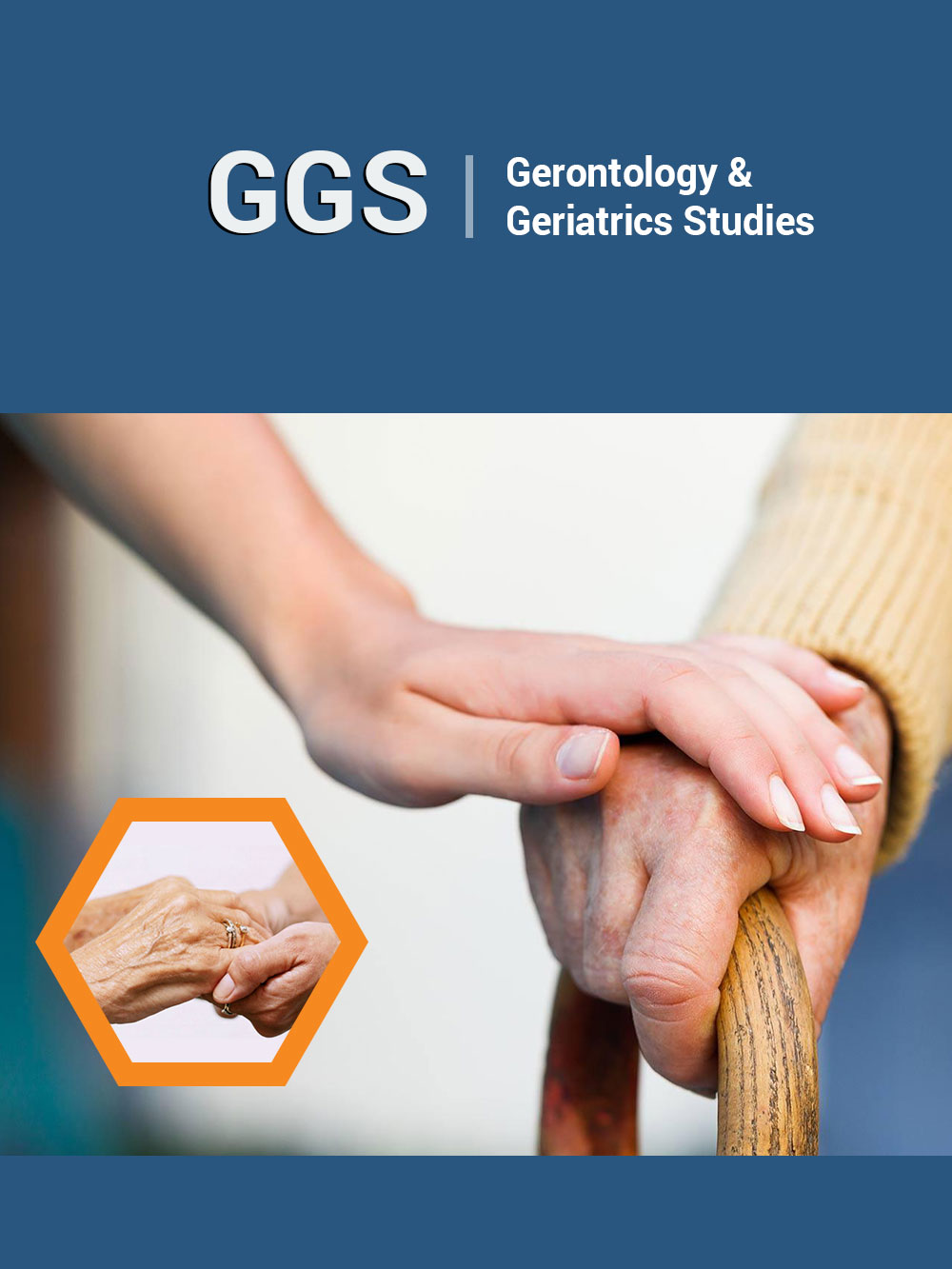- Submissions

Full Text
Gerontology & Geriatrics Studies
Impact of COVID-19 and the Perceptions of Elderly Adults: Narrative Mini Review
Ibtihal Abdallah*
Departmentof Clinical Pharmacy, Qatar
*Corresponding author: Departmentof Clinical Pharmacy, Qatar
Submission: January 12, 2021;Published: January 21, 2021

ISSN 2578-0093Volume6 Issue3
Mini Review
Coronavirus disease 2019 (COVID-19) which is caused by SARS-CoV-2 has infected more than 87 million around the globe as of January 2021. Since the emergence of the disease in 2019, it has caused the death of nearly 2 million individuals as reported by the World Health Organization [1,2]. According to the Centers for Disease Control and Prevention (CDC), deaths involving COVID-19 are highest among the elder population. Those of age >85% correspond to 30% (100,016/313,171) of COVID-19 related deaths in a week in the United States of America [3]. This group is followed by those aging 75-84 years (27%), 65-74 (21%), and 55-64 (12%) consecutively [3].
The pandemic has had its psychological burden on the senior population. In a qualitative study that aimed at understanding the experiences of elderly who live in aged care facilities, some interesting themes were identified through semi-structured, in-depth, one-on-one interviews with 10 participants. Elderly adults with multiple comorbidities expressed fear and feeling fragile and limited by their body due to their limited mobility and vulnerability to infections. Additionally, they expressed increasing loneliness as they become less capable of interacting and socializing with others in the care facility. This is an important psychological aspect to recognize when providing care to the elderly. Others expressed fear due to not being able to understand the real magnitude of the problem, as well as fear for their safety if they acquire the infection and need to go to hospital. A recognizable theme was the frustration due to the lack of resources in elderly care homes, lack of services they previously had, lack of attention from caregivers especially with many quitting due to fear of exposure to infections, and finally the lack of family visits and volunteers who used to come and provide company. All of these feelings came along with a sense of detachment from the outside world and being confined to a small space [4].
A study by Daoust aimed at testing the hypothesis that the elderly population is more likely to comply with the preventive measures of COVID-19 by looking at the data from 27 countries. Interestingly, this study found that elderly age (75-90 years) had a declining relationship with compliance to the preventive measures of COVID-19 in terms of prospective of self-isolation and the willingness to comply with it. Elderly was not found to be more likely to comply with the preventive measure any more than those at the 50s and 60s years of age [5]. This is understandable when taking into consideration that isolation and social distancing puts the senior adults at high risk for anxiety, depression, and potentially suicide [6,7]. Most elderly adults would find it challenging to deal with technology and keep up with social media and other communication platforms. Although digital literacy and access varies, but senior adults can be provided with the needful training to utilize these tools to provide them with support and networking. Furthermore, securing frequent telephone contact between the seniors and their loved friends and family members is another method and source of great support to their cognitive health. Volunteer organizations and healthcare providers might provide peer support, in addition to cognitive behavioral therapy being delivered through virtual platforms. Such efforts will help mitigate the sense of loneliness, fear, anxiety and the resulting irritability, panic, and wandering [6,7]. With the COVID-19 vaccine being approved and available, further research is needed to investigate and explore the perceptions and concerns of elderly adults towards administering it.
References
- Muge C, Krutika K, Jason K, Malik P (2020) Virology, transmission, and pathogenesis of SARS-CoV-2. BMJ 371: m3862
- World Health Organization (2021) Coronavirus disease (COVID-19) pandemic.
- Centers for Disease Control and Prevention (2021) Weekly updates by select demographic and geographic characteristics.
- Chee SY (2020) COVID-19 pandemic: The lived experiences of older adults in aged care homes. Millennial Asia 11(3): 299-317.
- https://journals.plos.org/plosone/article?id=10.1371/journal.pone.0235590
- Banerjee D (2020) The impact of Covid‐19 pandemic on elderly mental health. Int J Geriatr Psychiatry 35(12): 1466-1467.
- Armitage R, Nellums LB (2020) COVID-19 and the consequences of isolating the elderly. Lancet Public Health 5(5): e256.
© 2020 Ibtihal Abdallah. This is an open access article distributed under the terms of the Creative Commons Attribution License , which permits unrestricted use, distribution, and build upon your work non-commercially.
 a Creative Commons Attribution 4.0 International License. Based on a work at www.crimsonpublishers.com.
Best viewed in
a Creative Commons Attribution 4.0 International License. Based on a work at www.crimsonpublishers.com.
Best viewed in 







.jpg)






























 Editorial Board Registrations
Editorial Board Registrations Submit your Article
Submit your Article Refer a Friend
Refer a Friend Advertise With Us
Advertise With Us
.jpg)






.jpg)













.bmp)
.jpg)
.png)
.jpg)














.png)

.png)



.png)






